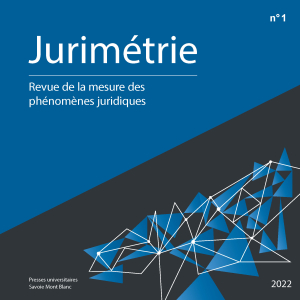Jurimetrics, Journal of the measurement of legal phenomena
Jurimetrics: n.f. from jus, juris, law, and metrum, measurement. A set of methods in the study of law which use mathematics to process statistical data relating to legal phenomena in order to improve their analysis or to identify scientific laws or constant relationships.
Call for contributions for the forth issue (deadline: december 31st, 2024)
The term jurimetrics brings together many scientific works already existing or in gestation using mathematical and statistical methods to better understand legal phenomena. Its applications can be very varied, in terms of the field of application (branch of law or litigation studied), the “process” involved (legistics, legal or administrative practice outside litigation, pre-litigation phase, litigation, enforcement of decisions) or the material considered (court decisions, contracts, transactions, justice management software).
Jurimetrics (or jurimetry) refers to all research and activities aimed at quantifying or describing legal phenomena (such as court activity, content of court decisions, transactions, contractual activity and content of contracts, production of standards from a quantitative point of view) using mathematical tools (counting, statistics, mathematical or logical modelling, etc.).
Jurimetrics, Journal of the measurement of legal phenomena (in French Jurimétrie, Revue de la mesure des phénomènes juridiques), publishes articles related to jurimetrics, whether they propose results or develop a reflection.
Proposals for contributions may come from:
- Researchers who are conducting or have conducted research using jurimetrics, whatever the field of law investigated. Presentations of tools and methods, results and possible impacts are expected.
- Practitioners who use jurimetrics tools or who are thinking about the impact of jurimetrics on their work.
- Developers of tools using jurimetrics, provided that their contribution is intended to contribute to research and the advancement of knowledge, and is not promotional.
- Researchers reflecting on jurimetrics, its origins, its functions, its prospects and its dangers.
In any case, it is necessary to insist on the methodological dimensions of the research presented. The attention of potential contributors is drawn to the fact that a large part of the readership of the journal is made up of legal scholars, and in general of people who do not necessarily have an advanced knowledge of the various branches of mathematics. Articles involving highly specialised mathematical concepts and methods must therefore be presented in a sufficiently pedagogical manner. If necessary, a system of boxes may be used to propose different levels of reading, with the most difficult elements of access appearing in boxes in order to allow a fluid reading of the contribution.
Submited articles will be subject to a double blind peer review; at least one of the reviewers will be a legal scholar. Articles should therefore be fully written; they may be written in French or English, and should be accompanied by abstracts in French and English. There is no limit to the number of pages or characters, except when the contribution may itself constitute a book. Tables or illustrations, in colour or black and white, may be included.
The articles selected will be published and the authors will be invited to present them, if they wish, at a seminar in Chambéry. The question of travel expenses for this seminar will be discussed between the organisers and the authors, it being understood that it is hoped that the latter can cover their travel expenses.
The bibliographical references can be presented, at the author’s choice, in two ways:
- Either in footnotes: F. Name, Title of the work, Publisher, edition number, year, p. or no. or F. Name, “Title of the article”, Name of the journal, Year, No., p. (the recommendations of https://reflex.sne.fr/ should be followed for citations of court decisions or laws).
- Or by indicating the author and year in the body of the text, with a reference to a bibliography at the end of the article.
Timetable :
- January 2024: publication of the call for papers.
- 31 December 2024: deadline for receipt of article proposals.
- End of February 2025: response to applicants.
- May 2025: annual jurimetry seminar in Chambéry.
- End of May 2025: deadline for submission of final versions of papers (modifications to accepted papers may be made after discussion at the seminar).
Papers should be sent to the scientific directors at Revue-Jurimetrie@univ-smb.fr
However, it is recommended to contact the editors of the journal before sending an article, at the above address, by sending them an idea or a draft article, so that they can give an opinion on the possibility of the article being published in the journal (particularly in relation to its theme). This opinion does not prejudge the acceptance of the final article, which will be submitted to the double-blind review process.
The Journal
- Creation: 2022
- Creators and directors: Christophe Quézel-Ambrunaz et Vincent Rivollier
- Design: Catherine Brun
- Publisher: Presses de l’Université Savoie Mont Blanc
- Distributor: Lextenso
Scientific Committee
- Danièle Bourcier, Cersa – CNRS
- Cécile Bourreau-Dubois, Université de Lorraine
- Marc Clément, Tribunal administratif de Lyon
- Giovanni Comande’, Scuola superiore Sant’Anna, Pisa
- Marianne Cottin, Université Jean Monnet – Saint-Etienne
- Christophe Dubois, Université de Liège
- Daniel Gardner, Université Laval, Québec
- Marta Infantino, Université de Trieste
- Benjamin Monnery, Université Paris Nanterre
- Fabrice Muhlenbach, Université Jean Monnet – Saint-Etienne
- Sacha Raoult, Université Aix-Marseille
- Teresa Rodríguez de las Heras Ballell, Universidad Carlos III de Madrid
- Isabelle Sayn, CNRS, Centre Max Weber
- Mathias Siems, European University Institute
- Étienne Vergès, Université Grenoble-Alpes
Selection process of the contributions
Responses to calls for contributions follow the following selection process:
- The editorial team of the journal checks that:
- The proposal corresponds to the scope of the journal.
- The proposal satisfies minimal scientific requirements, such as the absence of plagiarism, clarity, and presence of references.
If the proposal is rejected at this stage, the author(s) are immediately informed.
- The editorial team of the journal solicits two reviewers whose expertise corresponds to the theme of the contribution. The reviewers are invited to complete an evaluation document [ blank evaluation form].
In particular, the reviewers indicate whether the article can be published as is, or with major or minor revisions, or whether it should be rejected (possibly inviting the author to resubmit their proposal for a future issue).
The reviewers work anonymously, without knowledge of the author’s name, position, nationality, or institutional affiliation. They do not know the identity of the other reviewer. The author does not know the identity of the reviewers.
- In case of divergences between the reviewers on the possibility of publishing an article, the editorial team solicits a third reviewer: their opinion will decide the fate of the article.
In case of divergences between the reviewers on the extent of the requested revisions or on comments made on the article (e.g., one reviewer considers that there are too many citations, the other that there are too few), the editorial team organizes exchanges between the reviewers, while respecting their anonymity, in order to seek convergence. In the absence of convergence, the editorial team solicits a third reviewer.
- The editorial team informs the author(s) of the acceptance or rejection; the reviewers’ opinions are binding for the editorial team. The reviewers’ remarks and requests for revisions are transmitted to the author(s).
- When revisions or corrections have been requested, the editorial team verifies that they have been effectively made. When major revisions were requested, the article is sent back to the reviewers, who may give their opinion. The article is published only if the revisions and corrections have effectively been made.
Replays of the workshops
- 2023 : [Click here]
- 2022 : [Click here]
Vol 2 - 2023

Buy online : [Click here]
- Éditorial, Christophe Quézel-Ambrunaz et Vincent Rivollier
- Le droit est-il susceptible de protéger les océans ? Expérimentation de la mesure du caractère protecteur des réglementations des sacs en plastique, Odeline Billant et Marie Bonnin
- L’influence du choix des méthodes sur l’appréciation de la punitivité, Myriam Gibelin
- La notation des financements extérieurs publics des pays en voie de développement : proposition jurimétrique et application à quatre cas au Cameroun,, Jacques Fleming Mandeng Nyobe
Vol. 1 - 2022

Buy online : [Click here]
- Pour une étude raisonnée de la jurimétrie / For a reasonead study of jurimetrics, Christophe Quézel-Ambrunaz, Vincent Rivollier
- À la recherche d’une définition de la jurimétrie, Christophe Quézel-Ambrunaz
- Que reste-t-il de la première jurimétrie ?, Camille Bordere
- L’apprentissage automatique dans l’analyse des données de la jurimétrie : une comparaison des régressions et des arbres de choix, Sacha Raoult
- Apport de la science des réseaux pour l’analyse des décisions de la Cour pénale internationale, Raphaëlle Nollez-Goldbach et Fabien Tarissan
- Extraire des informations fiables des décisions de justice dans une perspective prédictive : des obstacles techniques et des obstacles théoriques, Julien Barnier, Bruno Jeandidier et Isabelle Sayn
- Le montant de l’indemnisation du préjudice d’affection devant les cours d’appel. Essai de mesure de l’influence du montant fixé en première instance, du montant demandé et du montant offert sur l’indemnisation devant le juge d’appel, Vincent Rivollier
- L’apport de la jurimétrie dans l’étude du contentieux de la Commission Nationale de Réparation des Détentions, Manon Viglino
- Biais, effets constants et modélisation mathématique dans l’indemnisation du préjudice corporel, Anaïs Gayte-Papon de Lameigné et Jacques Lévy Véhel
- Enseignements juridiques de la mesure scientifique de l’impact du réseau Natura 2000 sur les dynamiques des populations d’oiseaux, Gavin Marfaing
- L’accès des femmes à la magistrature au Liban : progrès ou épiphénomène ? Étude analytique sur l’effectivité du « procès équitable » dans un échantillon des jugements prononcés par le juge pénal unique de Baabda-Mont Liban, Azza El Hajj Sleiman
- La mesure des concessions réciproques dans les transactions, un retour d’expérience d’échantillonnage représentatif, Rodolphe Bigot
- Bibliographie générale de la première jurimétrie, Camille Bordere


